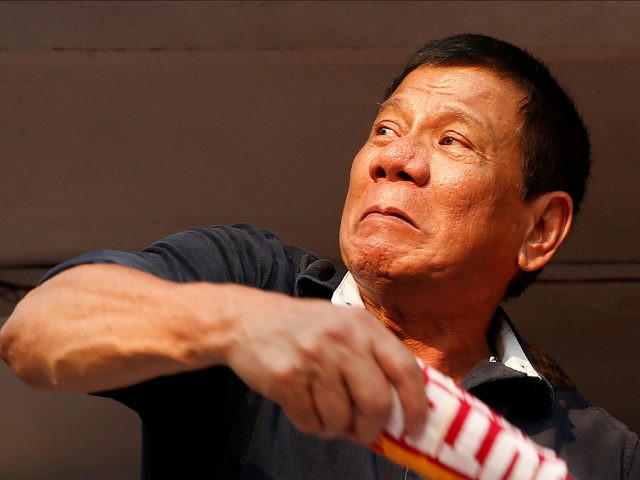Philippines President Rodrigo Duterte announced a new initiative to deepen business ties with China and Russia as investors flee the nation, concerned that the ongoing war on drug traffickers is increasing instability in the country.
In discussing his push to meet Chinese and Russian officials to attract investment, Duterte noted that he was preparing to “cross the Rubicon” with the United States. He did not elaborate on what he meant, though many have interpreted this as an indication Duterte is looking to weaken ties with his nation’s most reliable ally.
“I have talked to Xi Jinping. I’m going to China. I will open up all avenues of trade and commerce. They can come in,” Duterte said this week, speaking to an audience at an oath-taking ceremony for Philippine media associations. He said he had also spoken to Russian Prime Minister Dmitry Medvedev: “I told him I’m about to cross the Rubicon between me and the United States at least for the six years. I would need your help in everything – trade, commerce and I will open up.”
Duterte warned Philippine businesses that he intended to increase competition across industries to make services stronger and better, and was not concerned about the possibility of major corporations based in China and Russia wiping out domestic trade. To the airline industry in particular, Duterte said, “You go bankrupt? I do not care. I’m going to invite China and Russia to put up their airlines here. All of you, big businesses in public service: observe humanity.”
Duterte made clear he was “not really breaking ties” with anyone, implying the United States in particular, when seeking more investment from America’s greatest global rivals.
The Philippines is currently embroiled in a regional dispute with China, as Beijing continues to build military facilities on Philippine territory in the Spratly Islands of the South China Sea. The Philippines won a case in the international court at the Hague against China, a case China refuses to acknowledge and Duterte refuses to bring up during bilateral talks. Duterte has also asserted he would not participate in joint operations with the United States to secure Philippine territories in the region, saying during the event this week, “If America wants to go to war about the China Sea [sic], it can have its day.”
American officials have expressed some concern with Duterte’s foreign policy, as it has largely revolved around insulting the United States. Duterte has referred to both U.S. Ambassador to the Philippines Philip Goldberg and American President Barack Obama as “son of a whore,” adding in Goldberg’s case that he was an “annoying… homosexual.” Of Secretary of State John Kerry, Duterte has said, “he’s ok.” Duterte has also called for U.S. forces to leave the southern island of Mindanao, citing the threat of Islamic terror groups in that region.
“They’re a sovereign nation and we’re certainly not going to hold them back from pursuing closer relations with either of those countries… It’s not a zero-sum game,” State Department spokesman Mark Toner said of Duterte’s latest remarks regarding China and Russia.
Duterte’s Foreign Minister Perfecto Yasay has been investing his efforts heavily on assuring the United States Duterte still wishes to retain the special relationship between the two countries. Speaking on Tuesday, Yasay noted that American officials were “concerned about the fact that maybe perhaps that we were going to erode whatever gains that we have achieved insofar as the arbitral tribunal ruling is concerned” regarding the South China Sea.
“I told them that at this point in time, it is not in our national interests that we pursue multilateral negotiations with other countries who are not involved insofar as our dispute with China is concerned,” Yasay added. “[in Tagalog] What the president is saying, as I understand it, is that if you will be offered other countries such as China or Russia in so far as let’s say engaging our country with trade relationship and arrangement and assistance that they’re willing to offer, we should not be arrogant to reject it,” Yasay said.

COMMENTS
Please let us know if you're having issues with commenting.